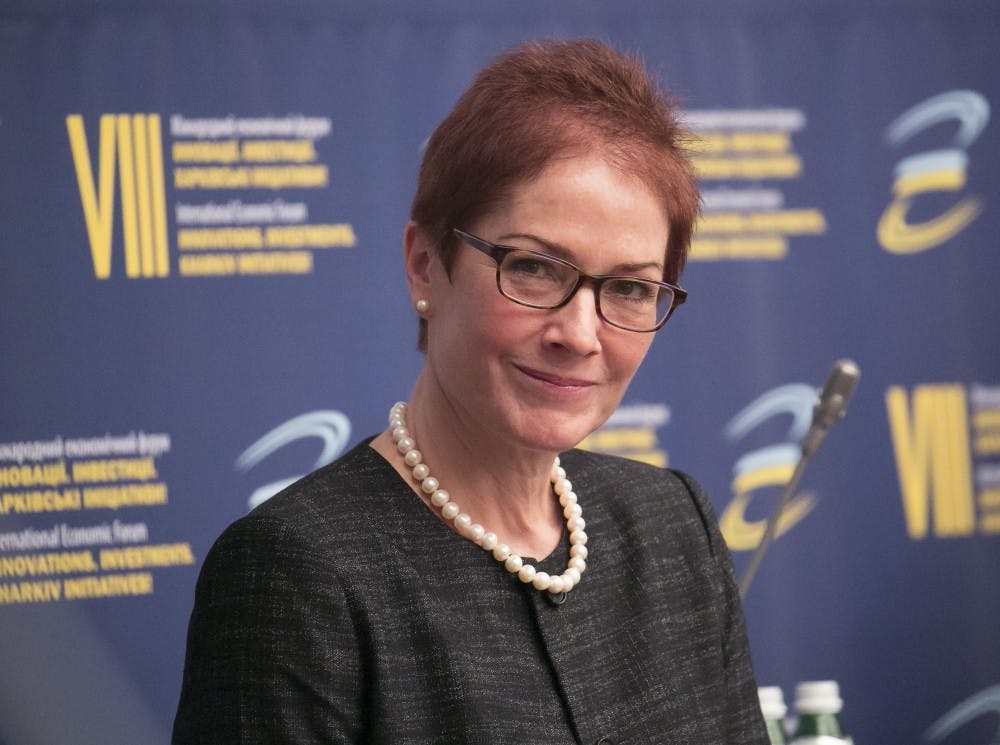On Oct. 4, the United States Department of State’s Inspector General revealed an attempt to bring down former U.S. ambassador to Ukraine Marie Yovanovitch ’80, who Democrats see as a key player in the impeachment proceedings against President Donald Trump, to congressional aides.
The whistleblower complaint that initiated the proceedings alleged that Yovanovitch’s ousting as ambassador was one of several actions that amounted to Trump’s abuse of presidential power. The complaint disclosed that a packet of documents containing misinformation about Yovanovitch had been sent to Secretary of State Mike Pompeo and circulated internally within the Trump administration.
Many members of Congress expressed concern of the packet being used as part of a wider plot by Trump to damage political opponents ahead of the 2020 presidential election.
New Jersey Senator Bob Menendez (D), a member of the Senate Committee on Foreign Relations, explained his fears of Trump’s harmful and unprovoked attacks on Yovanovitch in a statement, writing, “These documents provide further evidence of a concerted, external effort to conduct a disinformation campaign against a career U.S ambassador, who has been the subject of baseless attacks, including by the president himself.”
Maryland Representative Jamie Raskin (D) voiced his concerns about the precedent the packet may have set.
“The existence of this packet and its curious history raises profoundly troubling questions,” he told reporters. “Why was Secretary of State Pompeo in possession of this packet of disinformation? Why did he distribute and circulate it? To whom else did he distribute and circulate it?”
Personally recalled by Trump two months early from her diplomatic role in Ukraine, Yovanovitch is now scheduled to provide a deposition to investigators from the House committees on intelligence, foreign affairs, and oversight on Oct. 9.
Trump’s personal lawyer and former New York City mayor Rudolph Giuliani, as well as other external allies of the president, have repeatedly scrutinized and criticized Yovanovitch. They claim that her personal Democratic leanings and anti-corruption work had undermined Trump and obstructed his efforts to persuade Ukrainian president Volodymyr Zelensky to investigate the business dealings of former vice president and leading Democratic presidential contender Joe Biden, as well as his son Hunter.
Trump’s requests to investigate Biden, a potential political opponent, are currently the subject of the impeachment proceedings. As ambassador to Ukraine, Yovanovitch had close access to Giuliani’s actions outside of legal democratic channels.
Trump himself made the decision to abruptly end Yovanovitch’s three-year tour.
“The former ambassador from the United States, the woman, was bad news, and the people she was dealing with in the Ukraine were bad news, so I just want to let you know that,” Trump told Zelensky, according to the transcript released by the White House of their reconstructed phone call.
Trump has described this call as “perfect” and stated that the House impeachment inquiry amounts to a “hoax.”

Trump’s words about Yovanovitch have caused an uproar in foreign policy circles and among former diplomats and colleagues, who describe her as a “precise and conscientious” diplomat. Though she was known for keeping a low profile, Yovanovitch actively supported democratic development and anti-corruption efforts.
Yovanovitch moved to the United States as a toddler from Canada and became a naturalized citizen at age 18. She graduated from the University with degrees in history and Russian studies. She has spent over thirty years in diplomatic service, also working in embassies in Canada, Russia, Britain, and Somalia.
Last April, Yovanovitch delivered a lecture, titled “Ukraine: Challenge and Opportunity,” on campus. She was hosted by the Center for International Security Studies.









